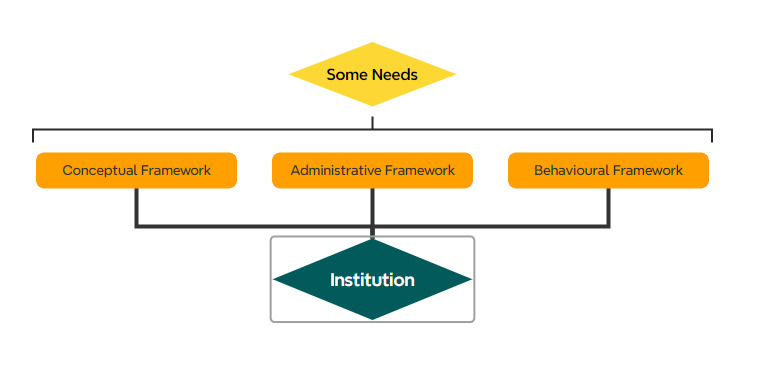Institution
An Institution is an organized system of conception, administration, and behaviour that structures thinking and behaviour with a view towards meeting various individual and societal needs.

Types
Institution > Administrative Framework, Authentic Institution, Inauthentic Institution
The Three Institutional Frameworks
Institution > Administrative Framework, Behavioural Framework, Conceptual Framework
Related LP Terms
Institution > Institutional Framework, Regime of Accumulation
Non-LP Related Terms
Institution > Human Development, School of Human Development
Institutions are foundational structures within society that serve to organize and facilitate various aspects of human activity, addressing both individual and societal needs. They can be effectively analyzed through three primary frameworks: the conceptual, administrative, and behavioural frameworks. This analytical approach provides a comprehensive understanding of how institutions function, their underlying principles, and their impact on society. Using banks as an exemplar, this overview explores these frameworks in detail.
The Conceptual Framework of an institution encompasses its foundational ideas, theories, and ideologies that define its purpose, objectives, and role within society. It articulates the institution's mission, core values, and the philosophical underpinnings that justify its existence. The conceptual framework is typically rooted in a specific Creation Template.
The Administrative Framework refers to the organizational structures, governance mechanisms, and operational processes that enable an institution to function effectively. It defines the hierarchy of authority, division of responsibilities, and the systems by which decisions are made and implemented.
The Behavioural Framework consists of the norms, codes of conduct, and cultural expectations that guide the actions and interactions of individuals within the institution. It encompasses both formal policies and informal practices that influence employee behavior and organizational culture.
Since institutions are formed within specific political and economic contexts, the specific form an institution takes will depend entirely on nature of the society within which it is created. Capitalist societies will generate capitalist institutions with capitalist frameworks, feudal societies will generate feudal institutions within feudal frameworks, and so on.
If we lived in a Utopian society, religions could help meet society’s need for an aligned, connected, loving, and empathic population. However since, as explained in detail in All About the System, we don’t live in a Utopian society, since we live in an exploitative society where powerful rich people extract money from a docile, indoctrinated, and compliant workforce, religion helps meets the needs for a docile, indoctrinated, and compliant workforce.
Since Capitalism is Regime of Accumulation and not a Regime of Distribution, since a Regime of Accumulation's is organized to facilitate private accumulation of abstract labour into the hands of a powerful Accumulating Class, and since the organization of society for the purposes of accumulation requires the subversion of humanity's Seven Essential Needs and the suppression of Full Human Potential, we may label all institutions within a Capitalist system, and indeed any Regime of Accumulation, as an Inauthentic Institution.
Notes
Institutions may be categorized as an Authentic Institutionor an Inauthentic Institution
Although we are often born into institutions, institutions themselves do not exist without tacit individual approval and acceptance of behavioural patterns. Teachers, for example, recreate the institution of education on a daily basis by their formal and informal participation in the behavioural patterns associated with the institution. It is the same with all institutions. An institution exists only when individuals voluntarily (or involuntarily) participate in the behavioural patterns. In other words, the behavioural patterns of institutions do not exist independently of the institution. We (and by "we" I mean the witting or unwitting participants in institutional behaviours) are taught the "ways" and behaviours of a specific institution. Teachers for example spend many extra years in school not only learning the technical component of teaching, but also the expected behaviours. The same can be said of any institution in society. The behaviours, norms, and values associated with particular institutions are "passed on." This process of learning the institutional ropes is known as Socialization.
Footnotes